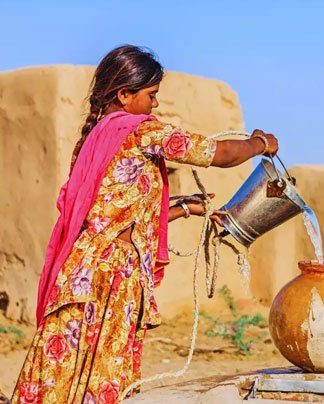
A village that seems to have dodged the relentless push of civilization lies hidden in Rajasthan’s Beawar area. Devmali is awarded the distinguished honor of India’s Best Tourist Village. Devmali is not just a village, a living example of irrevocable faith, fertile cultural heritage, and a unique way of life that has become the subject of national and global interest. The village sprawls over an area of over 3000 bighas in the breathtaking Aravalli hills. The spiritual and geographical heart of the village is Lord Devanarayan, a great, revered god of the Gurjars, whose magnificent temple crown.
Lord Devanarayan is the spiritually and geographically central deity of the village, a highly revered deity of the Gurjars, imposing a temple crowns the hilltop and lends its name to Devmali. Each aspect of Devmali's life is governed by this abiding passion for Lord Devanarayan, which dictates the city’s traditions, architecture, and the character of its people.
Devmali: A Village of Tradition
Devmali is a unique in its strong commitment to traditions and values passed down through the ages. The lack of pucca houses is perhaps the village’s most striking feature. Each house in Devmali is built from mud and thatch, a practice dating back to a covenant between Lord Devnarayan and the ancestors of the locals. Legends have it that the villagers decided to reside in temporary structures themselves, but when the god asked for shelter, they offered him permanent houses.
This devotion to tradition is not just limited to buildings. Devmali village is strictly vegetarian and teetotal. The people’s fervent commitment to a clean lifestyle and deep respect for their divinity are mirrored in the strict prohibitions on the consumption of meat, fish, and alcohol. The villagers also observe a ban on the use of kerosene and neem wood burning, showing an instinctive concern for environmental conservation.
Things to See in Devmali:
Besides being a source of understanding the specific tradition of rural Rajasthan, a trip to Devmali involves observing the village to find out its rustic mud huts, enjoying traditional Rajasthani food with a unique taste and visiting the Devnarayan Temple.
Devnarayan Temple –
The community’s deep spiritual reverence for Lord Devanarayan is manifest in both their architecture and spirituality. There are approximately 3000 bighas of village land dedicated to the lord, but there are no official records and no claims of ownership. The land is considered to belong to Lord Devanarayan, who is a folk god believed to be an incarnation of Lord Vishnu.
When Devnarayan took refuge here, the locals supposedly gave him a small hut and vowed never to construct permanent houses for themselves. They have upheld this tradition for over a thousand years, living in thatched-roofed mud houses because they believe that building houses out of concrete materials like bricks, metal, or cement would anger the god.
In the first week of September, thousands of people flock to the dunes near Meena’s Naya Village to attend an annual fair.
Best time to visit Devmali:
The ideal months to visit Devmali are from late October to March, when winter is setting in across Rajasthan and there’s pleasant enough weather to undertake exploration. Due to the scorching heat, it is best to avoid traveling during the intense summer months. Autumn and winter are the best seasons to undertake outdoor sporting activities, and visiting places is likely to be operational after the busiest summer months.
Conclusion –
A living historic site that captures the spirit of traditional Indian culture and unshakeable religion, Devmali is more than just a charming village. It’s a very remarkable place because of its unique traditions, the beautiful architecture of its thatch and mud houses, the holy Lord Devnarayan Temple and the remarkable sense of trust and community.
Visiting Devmali provides a glimpse into a way of life firmly rooted in tradition, and experiencing the hospitality of a community bound together by religion and faith. It reminds us about its richness in the conservation of culture, a good sense of society and good connections with one’s heritage and not in earthly possessions.